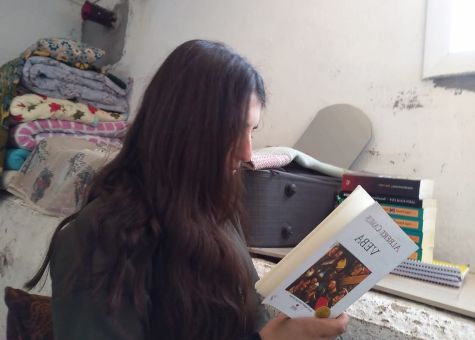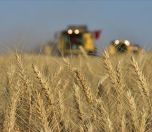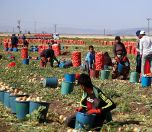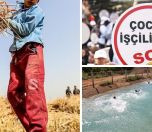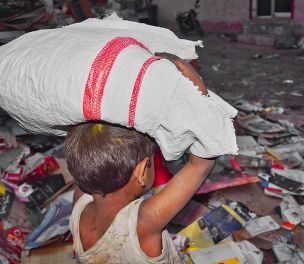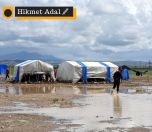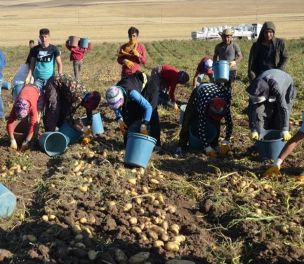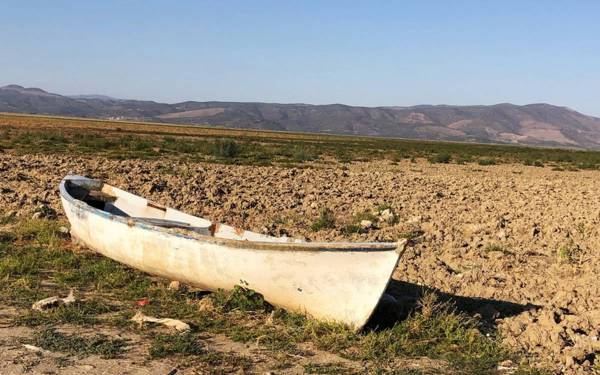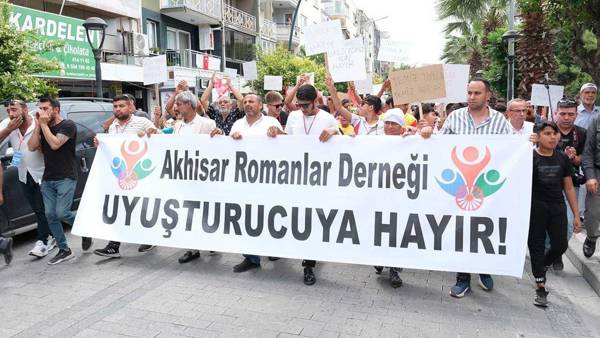* Photos: Esmer Değirmen
Click to read the article in Turkish
Coming from the eastern and southeastern provinces to the district of Gölmarmara in Turkey's Aegean province of Manisa every year, thousands of Kurdish and Arab seasonal agricultural workers are having more and more serious problems amid the COVID-19 pandemic.
Working in Manisa, where vegetable farming is common, seasonal agricultural workers work in very different places and jobs starting from April till October-November. While low wages are the biggest problem, they are also facing challenges in their housing conditions.
'Our wages don't meet our labor'
23-year-old agricultural worker Mahmut from Urfa's Viranşehir district complains first about the housing conditions:
"Our access to housing, food and drinking water is limited where we work. The vehicles that take us to the agricultural field are not safe, either. We are mostly taken there by tractors; we get cold a lot in the morning as it is open on all sides. It is also possible that we fall and die.
"We work for 7-8 hours a day, but as we don't have any legal assurance, it might increase to 10-12 hours a day. Every worker who comes here does it because of poverty. The wages we get do not fully meet our labor. Most of this money is spent for our round-trips to our hometowns."
Even accessing clean water is challenging
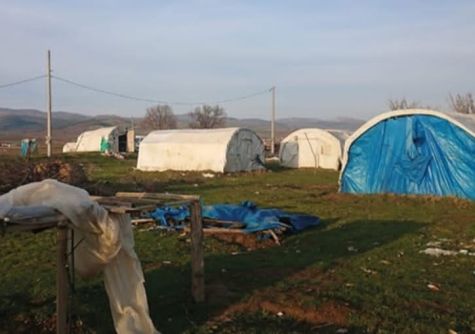
Staying mostly in places near the village exits in Manisa, seasonal agricultural workers live in either tents or jerry-built adobe houses. Meeting their needs for water from the water drills down the agricultural fields, workers are having difficulty in accessing clean water.
Living near a village exit in Manisa, B.A. says that they have been staying in the tents put up by their employers for 4-5 years:
"I came from Şırnak. We have been going back and forth for 4-5 years. The tents are always the same. We meet our need for water from the water pumps down the agricultural fields, but, most of the time, sandy water flows from there. Our tents are not that cold in summer, but we get very cold in the early morning hours. There are, of course, flies, insects and snakes.
"Sometimes, when the agricultural fields near us are irrigated, our tents' bottom sides might get wet and our dry food might get mouldy."
Women's burden twice as much
And, of course, women and children...
They are the cheapest labor of seasonal jobs. In addition to working in the field all day long, women also shoulder the burden of the "household chores" in places where they stay. In spite of this, their wages are much lower than those of men. Moreover, staying in places deprived of hygiene, women are more likely to suffer from infectious diseases.
Coming from Urfa to Manisa, R.T. is a young woman at the age of 20. She has been coming to Manisa to work for the last five years:
"What women need most in the places where they stay is hot water. We are trying to live in conditions far from being hygienic. We work in the same conditions as men and, in addition to this, the household chores are also awaiting us when we come back home. But the wages we get are not equal. There might be a gap of 10 lira between the wages."
R.T. underlines that the pandemic has aggravated the conditions and problems even more. She tells us an incident that happened last year:
"We came to Manisa in the first months of the pandemic. We came here by constantly undergoing identity checks and temperature measurements. The house where we stayed was inside the village and our house was side by side with the houses of the villagers. Gendarmerie officers were constantly dropping by and taking our body temperatures. I was seeing that the villagers were watching us from the windows, as if we had had the virus."
Student 'certified as agricultural worker'
15-year-old Mehmet is just 15 years old. He has come to Manisa with his family from Viranşehir district in Urfa.
He says he started working at the age of 12. He works for 8 hours in the field everyday. In the meantime, he is trying to attend the school via distance learning. His life between work and education is like a summary of the life thousands of children forced to lead in Turkey:
"I have been doing this job for 3 years. Before I came here, I had a certificate of seasonal agricultural worker issued so that I would not be considered absent from distance education. But my classes are interrupted a lot. I would really love to stay in my own hometown and to attend the classes there. At this age, I spend half of my year away from education, working in other places, instead of spending time with my friends."
Hundreds of children detached from education
Speaking to bianet about the hardships faced by agricultural workers in the region, Development Workshop's Manisa Representative İhsan İznebioğlu first raises concerns about the wage gap between women and men. He says that he has never encountered an equal pay system here.
Another problem is child labor. According to a field research conducted by the Development Workshop across Manisa in 2019, there were 1,360 children in 26 temporary tent settlements: "More importantly, only 13 of 989 children, 345 of whom in the mandatory education age group of 6-14 and in the age group of 15-18, could continue their education in the province."
Noting that pandemic measures have been taken and the public authorities have given cleaning and hygiene supplies, İznebioğlu says that seasonal agricultural workers are faced with tight controls due to travel restrictions:
"As the high number of passengers during the trips to workplaces poses risks amid the pandemic, they are frequently controlled.
"The number of tents has been increased and the number of people per tent has also been dropped in temporary tent settlements."
Education and Science Laborers' Union (Eğitim-Sen) Manisa Provincial Branch Chair İsmail Şener also says that there are no activities related to the education of child workers in Manisa:
"The children working as seasonal agricultural workers in Manisa are now completely off the agenda of the Ministry of National Education."
'I could read only 25 pages of the Plague'S.Ö. is a young woman. She has been working in agriculture for nearly 6 years now. She has come from a village in Urfa's Viranşehir to Manisa to work. She is also a student of a Nursing School. She talks about her life as a woman, as a student and as a seasonal agricultural worker:
"I have been constantly doing agricultural work in fields for the past 6 years. I do this job in order to earn pocket money as a student and to support my family. As the schools have been giving distance education due to the pandemic, I have a simple life between home and agricultural work in the field. Speaking about distance education... It is very bad. As I am a student of nursing, I have to take applied courses and, unfortunately, it is not possible with distance learning. "The place where I am is very hard for women, there is a constant pressure imposed by society on women. There is constantly an attempt to make women fit into the roles and moulds imposed on them. Women are not given the opportunity to take their own paths. As a woman, I don't have a proper circle of friends; we are even prevented from talking to strangers. In my hometown, it is even found odd that I walk on the street. Working in the agricultural field is really tiring for the body. When we get back from our workplace in the evening, I cannot make time for myself as I cook, wash the dishes and do laundry. I have been trying to read The Plague by Albert Camus for 8 days and I have been unable to read any further than the 25th page." |
221 thousand child workersAccording to the Turkish Statistical Institute's (TurkStat) 2019 Wage Structure Survey, the daily wage of male seasonal agricultural workers increased by 14.9 percent to 94 lira, that of women increased by 17.9 percent to 79 lira. The 2019 Child Labor Force Survey of the TurkStat also showed that the number of children working in economic activities was 720 thousand. 221 thousands of these children were working in the agricultural sector. |
(ED/SO/SD)





.jpg)
